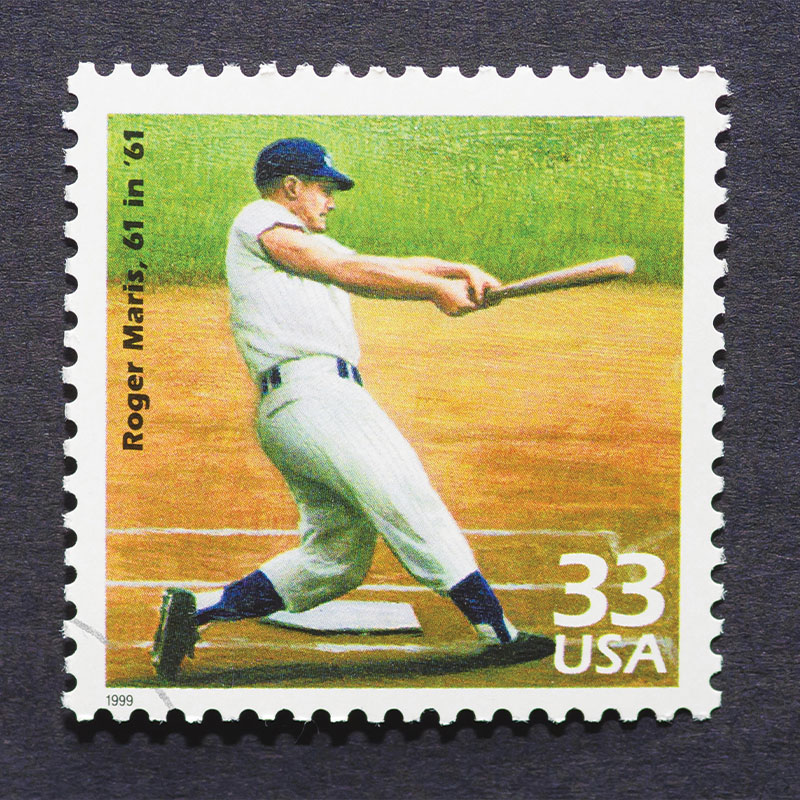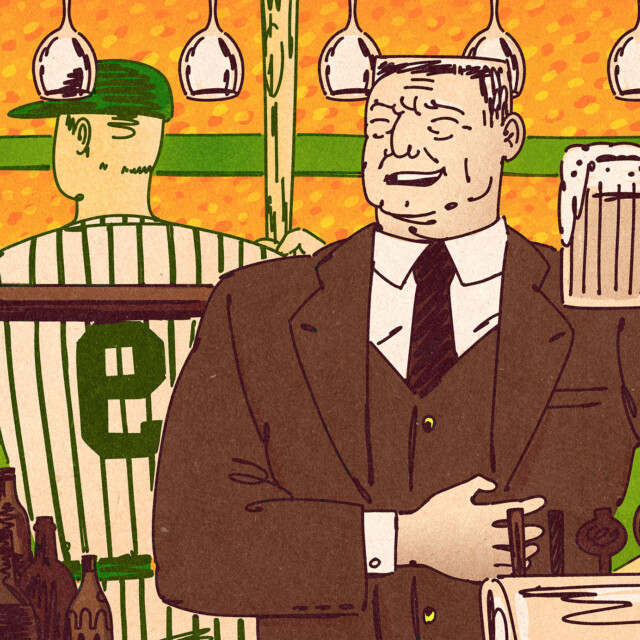On Oct. 4, New York Yankees’ slugger Aaron Judge hit his 62nd home run of the 2022 Major League Baseball season. Though certain fans treated him like it, the feat did not technically make Judge the all-time home run king; but it did top the record of another former Yankee, Roger Maris, who in 1961 had topped Babe Ruth’s astounding 1927 total.
While Maris never quite became a Hall of Famer like Ruth or his beloved teammate, Mickey Mantle, he had a more than respectable career, claiming two MVPs and seven All-Star game appearances. Judge will probably win his first MVP this year, and is well on pace to make the Hall of Fame, but he almost certainly won’t have the same post-baseball career as Maris:
Beer salesman.
In this modern era of the so-called overpaid athlete — Judge is expected to sign a $300 million contract in the off-season — there is no need for other jobs, certainly not as a beer salesman. If a retired athlete today gets into the alcohol game, it’s purely in the form of a cash grab celebrity spirit, like the tequilas of LeBron James and Michael Jordan, or the bourbon of Peyton Manning and Andy Roddick.
But that wasn’t the case back in the 1960s, when athletes actually needed to find another job. And Roger Maris had a good strategy for that. Early in his career, he had met a man who owned a beer distributorship and was now doing quite well for himself. From that day forward, Maris set his sights on selling beer.
“He didn’t care what kind — Miller, Coors, you name it,” former teammate Clete Boyer recalled in 1989.
After setting the world on fire with the New York Yankees in the early ‘60s, by 1966 Maris was recovering from a severe wrist injury, his production at the plate was dwindling (.233 with 13 home runs), and even his team was far from their glory days (that year the Yankees would finish dead last in the American League). At the end of the season, the Bronx Bombers traded Maris to the St. Louis Cardinals. Disillusioned, he told his good friend, celebrity fixer “Big” Julie Isaacson, that it was finally time for him to retire from the game.
“I said, ‘Roger, don’t you see?’” the late Isaacson recounts in Tony Kubek’s book “Sixty-One.” “‘You’re finally gonna get that beer distributorship. Think about it. Who owns the Cardinals. Old man Busch, right? Busch, Budweiser, Michelob. For years, all you talked about was getting a beer business. Now you can do it.”
The Beer Ball League
Even by then there was a long history of baseball being involved with the beer industry.
The American Association, in fact, had been founded in 1882 as a bit of an antidote to the puritanical and stuffy National League, which did not allow teams to sell beer at its ballparks. In “the Association,” however, several teams were actually owned by breweries in German-heavy cities like Milwaukee, Cincinnati, and Pittsburgh, which saw baseball as a better way to sell their product to the unwashed masses. National League owners would begin pejoratively referring to their competition as “The Beer Ball League” or “The Beer and Whiskey League.”
But the Major Leagues would also come around to the beautiful marriage between baseball and beer; their teams would soon come to be owned by brewery magnates as well. Not just the Buschs and their St. Louis Cardinals, but Jacob Ruppert of Knickerbocker Brewery, who famously owned the Yankees during Ruth’s heyday, and National Brewing Company owner Jerold Hoffberger, who also claimed the Baltimore Orioles.
By the 1940s, beer was regularly advertised during radio and television broadcasts — whether Hamm’s for the Minnesota Twins, Narragansett for the Boston Red Sox, or Stroh’s for the Detroit Tigers. Individual broadcasters became known for their sponsored beers, like the Yankees’ Mel Allen, who would call a home run a “Ballantine Blast.”
Individual players would also hawk beer until the 1950s when the practice was banned by the Major Leagues. That would lead to strictly retired ballplayers selling products, like Maris’s teammates, the wildly popular and well-known carousers, Mantle and Whitey Ford, who did commercials for Miller Lite in the 1970s.
Maris himself was no stranger to the beer business either. His great-uncles had run taverns in Hibbing, Minn. While in high school, he himself had spent summers unloading freight cars full of Pabst Blue Ribbon. He was also close friends with Mike Roper, a Schlitz distributor, while a former teammate, Joe DeMaestri, had likewise started a beer distributorship in California.
And, most important of all, Maris actually liked beer.

If Mantle and Ford would typically drink double Scotch & sodas with teammate Billy Martin until 8 a.m., Maris preferred to take it easy with a few beers after a hard-fought game, before heading home to spend time with his family.
Maris Distributing
It wasn’t a cinch for Maris to get that beer distributorship, however. Isaacson had to negotiate with Cardinals’ GM — and living legend — Stan Musial, who immediately shot the idea down. Team owner “Gussie” Busch had never sold a distributorship to a player. Finally, they made a unique deal so Maris would be allowed to buy one after he retired.
“Anybody who hits 33 homers and drives in 100 runs deserves a beer distributorship,” Busch said in 1967.
Maris would play his final two seasons with the St. Louis Cardinals, even helping them win a World Series title in 1967. He made $75,000 in that final year. A good number by the day’s standards — it would equal about $650,000 today — but hardly enough to sit on the beach for the rest of his life.
But Maris wouldn’t have wanted that anyway. Entrepreneurially driven, Maris already owned a gas station near his hometown of Fargo, N.D., where, in the off-seasons, he would work the pumps and change oil. It was not particularly profitable, however, like he assumed beer would surely be.
And so, after the 1968 season, a 34-year-old Maris moved to Gainesville, Fla., to start and run Maris Distributing, bringing along his brother Rudy, known for his keen business sense.
Unlike other more charismatic players like Mantle who used their fame and charm to sell things like life insurance, Maris was known for being particularly shy and modest, not liking to capitalize on his past diamond heroics. Even so, beer industry competitors would use Maris’s celebrity against him, telling retailers that such a big-shot ballplayer would never be around to meet their needs. Instead, the famously hard-working Maris actually rode on his delivery trucks, hand-delivering beer to clients.
“He would show up in bars, buy everyone a Bud, and talk up his product,” former Cardinals teammate Mike Shannon once recalled. But it was even more than that. As Maris told sportswriter Ira Berkow, “[On a typical day,] Rudy and I drive to the brewery in Jacksonville, we go into the taverns and supermarkets and other outlets to see how our Bud stock is, how it’s placed on the shelves.” He would often work from 8 a.m. until 1 in the morning the next day.
The business had soon tripled, reportedly making Maris around a half-million dollars a year. Once it became a well-oiled machine, Rudy was able to run the day-to-day operations while Maris reluctantly started using his celebrity to appear at golf tournaments and other public relations events for Busch. Still, by 1971 the The New York Times was comparing the famously press-shy Maris to enigmatic recluses J. D. Salinger and Howard Hughes.
“My customers used to talk baseball a lot,” Maris told The Times, “but not so much anymore. Now and then they’ll ask me how I think the Cardinals will do, or something like that. Myself, I never look at the standings. Not at all; too busy.”
But, by the late-1970s, Maris began attending Old-Timers games and other events held by the Yankees and Cardinals, sometimes even supplying the events with gratis beer. Current players would marvel at the home run king and now prosperous beer salesman, while poking fun at his newfound physique.
“We’d get on him about his beer belly,” his former teammate Dal Maxvill recalled in “Roger Maris: Baseball’s Reluctant Hero,” “and how he was drinking all his profits.”
The Beer King
Maris died of non-Hodgkin lymphoma in 1985 at the age of just 51. Gussie Busch would die a few years later.
But Rudy Maris (along with Maris’s wife, Pat, and son Roger Jr.) would continue to run Maris Distributing for years, turning it into a $50 million-a-year business with over 100 employees. Its distribution footprint would span 13 counties in north-central Florida, selling some 2 million cases per year.
The home run king was now arguably also the most successful beer distributor in the country.
Perhaps too successful, however. Because in 1997 Anheuser-Busch tried to terminate its franchise agreement with Maris, halting beer supplies in a move to try and get the lucrative distributorship back in its hands. August Busch III ran a tighter ship than his father Gussie and was not sentimental about Maris’s time with the Cardinals. (He perhaps had no sentiment at all, selling the Cardinals in 1995; while in 2008 his son August Busch IV lost the family brewery to multinational conglomerate InBev.)
The Marises had no choice but to sue the beer giant for anticompetitive behavior. At the same time, both Mark McGwire and Sammy Sosa were on the verge of eclipsing Maris’s single season home run record, many would later say aided by their own anticompetitive behaviors.
In 2005, two decades after Roger Maris’s death, Anheuser-Busch finally agreed to pay some $120 million in cash to his heirs as part of a settlement that ended a defamation trial. Today, Maris Distributing is no more, replaced by a scaffolding company, but Left Field Brewery, in Toronto of all places, continues to honor the slugger’s contributions with its Maris* Pale Ale.
By the end of his life, even Maris realized his role in beer might have been as massive as his role in baseball; though the two would always be intertwined because beer and baseball, as he realized, will always be intrinsically linked to each other.
“Don’t quote me on this,” Maris told The New York Times’s Robert Lipsyte before he died, “but if they ever manage to ban beer advertising in baseball you can kiss the national pastime goodbye.”
